
This talk was given 20 April 2010
The text here may not be identical to the spoken text
Chartered Institute of Housing Cymru
Annual Conference 20 April 2010
I’m
Paul Lewis a freelance financial journalist, although best known I guess for my
work presenting Money Box on Radio 4. But I also write the money pages in Saga
Magazine and write for its website. Some of you may see that – I know at your
Mum’s or your granny’s in your case. And if you have trouble sleeping you can
read everything I have written since 1996 on my website or on one of theirs.
But
I am not here representing Saga, or Money Box or, god forbid, the BBC.
I
am very glad to be here in Cardiff. City of Vertical Drinking as I learned the
other day. And I suppose horizontal travelling home. I am sorry I am not staying
the night. My mother’s family name is Griffiths so at some point my family was
from Wales but I have never been able to find that point I have to confess.
So
let me be clear – if you hadn’t guessed – that I am from London and I am going
to be talking mainly about the UK rather than Wales – not least because we are
in the middle of an election campaign to elect the UK parliament – the
Westminster as some here call it which has three Plaid Cymru MPs. And of course
many more from Welsh constituencies.
Despite the powers given to the Welsh Assembly the economy, taxes, and still
after the recent deals done when parliament was dissolved some housing policy is
still decided by the Westminster parliament.
I
am going to talk to you today about debt. About the government’s debt and what
can be done about it.
There is nothing wrong with debt. Debt helps us manage our income, even it out
over the times and the things we want but can’t afford. So debt is fine.
Borrowing to even out a lumpy income was invented by
Edward I more than 700 years ago – (1272-1307). His royal income from wool and
hides was seasonal. But his expenditure was smooth – paying the royal retainers.
And
he wanted a provision for fighting wars – mainly, I’m sorry to say! – against
the Welsh. So he in effect sold his lumpy income to the Ricciardi family of
Lucca in Italy.
In
exchange they paid his bills and provided him with cash when he needed – it was
remarkably like a modern current account with an overdraft. There was no formal
interest charge – that was forbidden by Christian rules against usury – much as
Islam prohibits it today. But academics reckon that the charge was around 15%.
Which is about the return which today’s banks expect on their capital. I expect
the Ricciardi paid themselves large bonuses out of it as well. Though in 1294
they went bankrupt. Those were the days. When banks that got things wrong were
allowed to go bust.
So
borrowing money to smooth out your income is not bad. It has been going on for
more than 700 years. But Edward was very prudent. He made sure that he did pay
off the debt when times were good.
Now
before I embark on today’s government debt I should say at the start that I am
not an economist. I am journalist – though, unusually, a numerate journalist. I
often annoy my friends by saying you can only understand things you can measure
or count.
I am going to talk today about some very big numbers. Far too big for the human brain to comprehend. Let me show you something first.

How many blobs? 3. And now?

Yes. 5. And now?

Not
so easy is it. If you got nine that is very good. The human brain can see 7
normally without counting. And when things get bigger we try to reduce them to
groups so we can manage them. So here you might see three lots of three or nine.
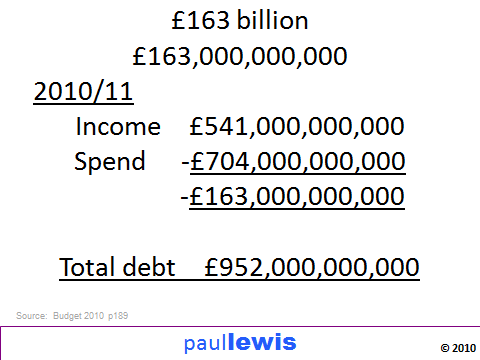
Billions, millions, trillions, very hard. But £163 billion is the amount that
the Government debt will grow this year. In other words in 2010/11 the UK
Government will spend £163 billion more than its income from taxes. So this
deficit as it is called is actually no more than an overspend. Income £541
billion, spending £704 billion, overspend £163 billion. And that overspend this
year is added to that of previous years and we have accumulated a debt of £952
billion, close on a trillion or 1000 billion or a million times a million.
Trying to bring this debt to some level those of us even with very large
overdrafts can comprehend a Conservative MP the other day said that to build up
a debt like that you would have to borrow £1.2 million pounds every day since
the birth of Jesus. Christ almighty.
In fact
it is slightly more – £1.3 million a day – got confused over leap years or
something.
But
he also got the figure completely wrong. That is the danger of simple
arithmetic. In fact if you started borrowing at that rate in the year zero,
which is 1 BC, and paid interest at 4% you would build up a debt of £952 billion
not by the year 2010 but in the early days of the year 112 when the Romans were
still here. And by now 2010 your debt would be unimaginably high.
In
fact if you borrowed as little as one penny every day since Christ was born at
4% interest per year it would have grown to the current debt by the year 765.
And 1p a day at 1% annual interest would by now have reached our current debt of
around £950 billion. So not such a great
propaganda point to say oh it’s like the Government borrowing a penny a day for
2000 years. But that is it – at even 1% a year interest.
But
even with simple arithmetic borrowing £1.3 million a day for 2000 years is
fairly meaningless. I find it hard to imagine a hundred years never mind more
than 2000. And I can’t imagine one and a quarter million pounds either – though
obviously some of my colleagues at the BBC don’t have to imagine that they can
just look at their bank statement. So two numbers that are too big for me to
imagine making a number that is doubly unintelligible.
So
let’s try something else. One popular measure for large amounts is the size of
Wales. An area of rainforest the size of Wales is destroyed every year or
sometimes people say every day. Let’s cover Wales in £10 notes how does that
compare to our debt? Well you only need to cover a twentieth of Wales in tenners
to get the £952 billion we owe. So maybe that’s like covering Conwy in £10
notes. So perhaps it’s not that much?
And
let’s bring that £952 billion down to the human scale – to you and me. There are
47 million adults in the UK. So our total debt is £952 billion divided by 47
million which is £20,255 per adult. Now I know people who owe that much on their
credit card. And the overspend this year is £3,436. So while it is not a good
idea to overspend £3,436 when you already owe £20,255 it need not be a disaster.
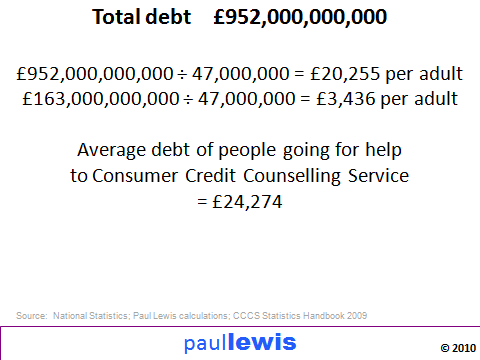
And
incidentally the average debt of people who go for help to the Consumer Credit
Counselling Service is £24,274. So we are close to that level and as a nation we
are in need of help. Of debt counselling.
But
you can look at our debt in another way. £20,255 is rather less than the average
income of a full time worker in the UK in 2009. Latest figures show that it is
about £25,412 – though rather less in Wales about £22,921.
And
stats from CCCS show that people tend to go for help when their debt equals
about 1.5 times their annual earnings.
But how does that compare to the UK’s income.
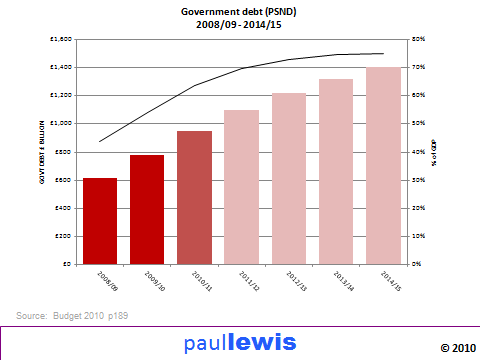
Here it is as a graph. The future is pink because they are just forecasts. Now
our national income is called Gross Domestic Product or GDP. And here is the
debt as a percentage of GDP. And you can see it rising from just over 40%in
208/09 to a forecast of almost 75% in 2014/15. You may recall of course Gordon
Brown’s Golden Rule that debt should not exceed 40% of GDP. Now it was a figure
plucked out of the air but while Chancellor he managed to achieve it. But now it
is taking off and will on these predictions be 75% of GDP by 2013/14. But that
is still only half as much as the debt level when individuals say enough at 1.5
times annual earnings.
And
internationally this isn’t bad either. Looking at the 27 nations in the EU in
2008 we are about the middle for debt – blue bars and ours is coloured green –
and in fact below average – those bars on the right there. But that was 2008 and
our deficit is big – the red bars and in our case the black one. And that will
make our debt grow strongly, worse than many others.
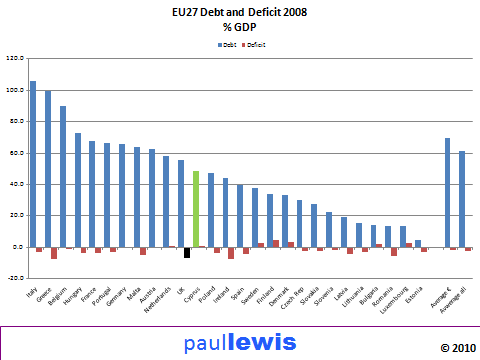
So
we need a plan. A plan to cut our debt. Just as someone going to CCCS with a
debt of 20,255 and planning to borrow another £3,436. And that is the message
from the people who we owe that money to – or their agents. We need a plan. Or
they will be reluctant to lend to us any more.
People often say to me the debt is a trillion pounds who do we owe that to? Who
has got a trillion pounds to lend us? In fact our debt is knocking on a trillion
pounds now - £952 billion – and by 2014/15 will be about 1.4 trillion – so we
need to borrow another half a trillion pounds in the next four years.
I
went to Canary Wharf a couple of weeks ago to Barclays Capital where they trade
in Government bonds and asked – how do I borrow half a trillion pounds, £500
billion, who will lend it to us?
About a third is from our own pension funds. They amount to far more than that
and they are keen to lend money to the Government in return for a secure income.
Another third is from abroad – foreign wealth, the so called sovereign wealth
funds of oil rich states and of course China. And the rest is from a mixed
variety – wealthy individuals, retail investors in the UK and elsewhere who buy
into government bonds.
Now
these bonds work in a simple way. You pay say £100 to the Government and in
exchange it promises to give you back your £100 after a fixed time – say 10
years or 15 years – and over that time it pays a guaranteed rate of interest. At
the moment for the UK that is about 4%.
Big
investors like these because (a) the return is fixed and safe – guaranteed by
the UK Government – and (b) the capital is returned at a set time and that is
also guaranteed by the UK government – a Government which has never ever
defaulted on its sovereign debt ever since 1272.
But
of course it is only as safe as the Government that guarantees it. And we have
seen recently with Greece that because people are very worried about its debt –
much bigger compared to its income than ours – it has to pay more than 6% to
borrow the money it needs. And recently the EU offered to lend Greece €30bn at
around 5% to help it out.
It
is just the same as individuals. If you take out a Bank of Scotland Easy Rate
Mastercard and your credit rating is excellent you will be charged interest of
8.9% APR. If it is not so good then the rate will be 12.9% APR. And if it is
average then it will be 14.9%. Or you might be offered a Plus Mastercard at
16.9% or if your rate is OK, one at 19.9% if it is bad or even 21.9% if it is
terrible. They call it pricing for risk.
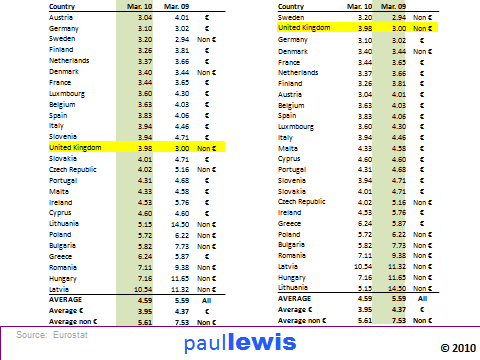
It’s the same for countries. Though less extreme. At the moment the UK is paying
about 4% to borrow the money it needs and Greece is paying about 6.2%. Greece is
the riskiest of the Euro countries. And up here is Austria and Germany and then
down at the bottom Latvia and Hungary. So we are mid-table.
But
a year ago we were near the top. Over the last year we have moved from near the
top to the middle. And if the markets are not convinced that we are dealing with
our annual overspend then that rate will grow further.
Now
what does this mean? We owe a lot of money so even 4% or thereabouts costs a
great deal. Here is what the UK Government is planning to spend this year.
And
you can see that out of the £704 billion £43 billion or 6% is on debt interest.
Paying out those investors who have lent us the money we need to survive. That
is more than the £40 billion defence, more than the £36 billion on the police
and similar things, nearly double the £22 billion we spend on transport, and a
lot more than we spend on this – housing and the environment £27 billion. So
paying the interest on the debt we have is one of our biggest expenditures.
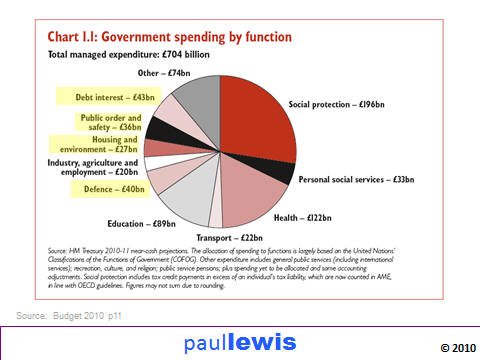
So
that is what we spend and this is what the Government gets in – principally from
taxes – is just £541 billion. So the Government will spend £163 billion this
year more than we take in. That is the deficit. And of course it is added to our
debt which is already huge to leave it at £952bn by the end of the year.
And
look at the debt interest we pay in relation to these income sources - £43
billion remember. It is as much as all the corporation tax paid by companies. It
is about as much as all the excise duties on alcohol, tobacco and petrol. So
next time you fill your car with petrol – or do a bit of vertical drinking – all
that tax is paying for the debt on our loan. Far more than council tax, and half
the amount from VAT – so that could 8% if we did not have this debt to pay. And
it’s about a third of what we get from income tax. Basic rate could be cut from
20% to about 10% if we didn’t have this debt to pay.
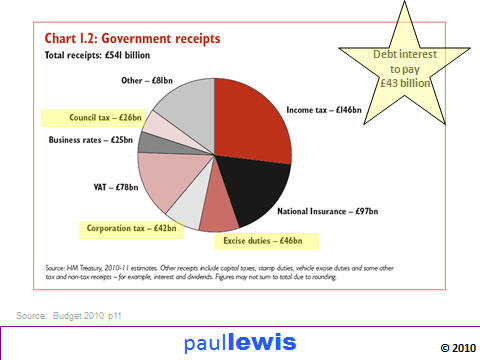
So
just servicing this growing debt is costing each of us a lot of money. That is
£900 a year that each adult is paying in tax so that investors can have their
interest.
If
someone went to consumer credit counselling service or national debtline with a
£21,000 consumer debt and said I am planning to spend another £3600 that I don’t
have the advice would be ‘whoa. You must cut your spending and boost your
income’. And for a Government that means spending cuts and tax rises.
Now
the present government has set out its plans to reduce the deficit. But here is
the debt as it will grow. Important to get these two clear. The debt will grow
but the overspend will reduce so we are adding less to the debt each year. Here
is the deficit each year in green. That is getting less but we are still
overspending more than our income by 2014/15 so the debt is still growing. In
fact our deficit will more than halve from £163 billion this year to £74 billion
in 2014/15. So our debt is slowly coming under control. But not yet falling.
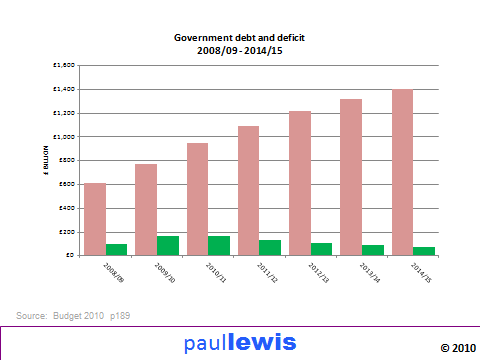
And
although those figures are set out in the Budget the Government has not really
been upfront about what the numbers mean.
Because we know the totals. What the Government didn’t tell us are the
implications of that total – how you can achieve it. What we don’t know is how
that spending cuts will be allocated.
A couple of
weeks ago I went to the Institute for Fiscal Studies – one of our great
economics think tanks – and tried to cut this expenditure.
We
are planning to spend – by ‘we’ I mean the present Government and we have no
clear indication from the others how much less they would spend – we are
planning to spend £704 billion this year 2010/11. And over the next five years
that is planned to stay pretty much the same in real terms in other words when
you take account of price rises. So by 2014/15 it will be £703 billion. In fact
it will be £773 billion but in real terms that will be the same then as £703
billion is now. So in effect spending is frozen.
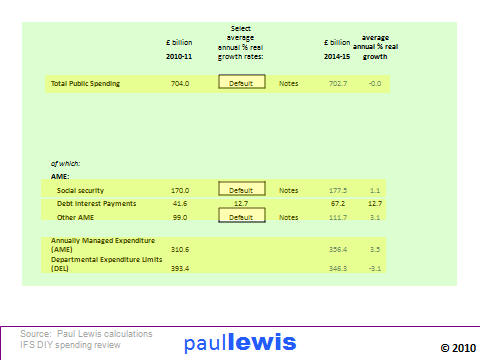
But that hides the big problem. Which is that a lot of spending ISN’T frozen. Social security for example which includes retirement pensions is set to rise by 1.4% a year in real terms according to Treasury forecasts. There will be more older people for example, and that will drive up the cost. Social security is part of what is called annually managed expenditure which is very hard to freeze – look at the fuss in the year 2000 when the state pension only rose by 75p a week – inflation was low then and that was in line with it but there were huge protests. So the pension will rise by at least 2.5% whatever inflation is. Despite that there was anger this year – although the basic pension rose by £2.40 the rest – including SERPS – was frozen. More older people and more expense from state pension when, from 2012 on the Labour plans and sometime soon after that on all plans – the state pension will go up in line with earnings so then it will start rising in real terms.
Then there is
that debt interest – sorry but that cannot be avoided and as the debt grows so
does the debt interest. That is expected to rise from £42 billion to more than
£67 billion over the next five years – which is a rise of
nearly 13% a year.
And if our attempts to keep borrowing down fails then that could rise further –
remember the rate we pay has already risen from 3% to 4% in a year. Another 1%
would add billions onto that bill.
And
then there are things like public sector pensions, contributions to Europe, and
so on. That comes to a staggering £99 billion a year. And that is expected to
rise by 3.1% a year. So this AME will rise from £311 billion to £356bn. Already
almost half of public expenditure is very hard to cut.
And
that means the other expenditure which can be cut will anyway have to fall from
£393 billion to £346 billion That is a cut of 3.1% a year. A cut over the
following three years of 12% £1 in every £8 we spend. But can we do that?
Let’s look at that spending in more detail.
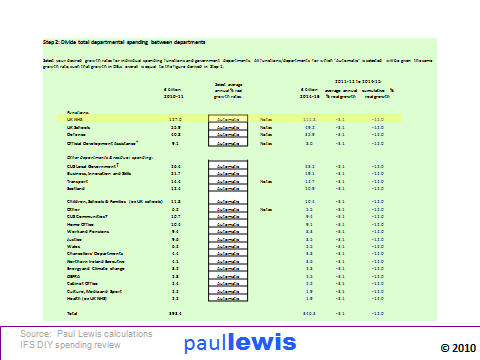
Number 1 is the NHS £127 billion a year. Now this table assumes the NHS will
face the same 3.1% cut per year as everything else. But over the 13 years of
Labour government that has grown by 6% a year. The King’s Fund medical charity
estimates it has to grow by 1.6% a year just to stand still as wages rise, drug
costs rise and targets and expectations rise. So to keep it still even at 0%
would be a cut. So let’s put the 1.5% –
almost – King’s Fund rise in there. Now as soon as you do that the rest of the
world has to make that cost up. So immediately instead of cutting everything
else by 3.1% a year you have to cut by 5.6% a year. It’s just arithmetic.
Schools well we
want to protect them and that’s £55bn untouchable.
Labour is committed to preserving spending on schools – so let’s put that in no
growth but no cut. And remember spending on education has grown by 4.1% every
year by the present government. So if we put 0% in there again everything else
faces a bigger cut 7.2% a year.
Defence – very tricky. Now there are people who would like to see us out of
Afghanistan. They would like to see us not waste so much money on defence
projects which are billions over budget and years behind schedule delivering
weapons systems that are out of date when they finally arrive. Eurofighter being
one example. But if you are hoping to for example scrap renewing our Trident
nuclear fleet – £76 billion of costs – or cutting it to three rather than four
vessels, that won’t help in this period because the costs and hence the savings
will begin in 2015. Defence spending has grown by 1.8% a year under the
Government but let’s say that we freeze it. That’ll still mean cuts – wages,
equipment etc, but let’s freeze it. And then there is development aid – not a
huge amount but we are committed to raising it so we spend 0.7% of our GDP. Now
that should mean raising our help for other countries by 9.2% a year. But let’s
freeze that.
All
that’s left – police (which incidentally Labour is committed to preserving
intact but is not protected here), the courts, the prisons, all the civil
service in job centres, tax offices, culture, sport, social services, local
government, grants to Scotland and Wales to do what they do for national policy,
the Border Agency and so on all of those total about £160 billion.
Now if we cut
all of that out completely – close the courts, the universities, jobcentres,
social services, transport subsidies, roads – even if we stopped all those
tomorrow we would only just balance the budget. And of course we can’t do that.
And remember that so-called ‘frontline services’ are protected by the major
political parties. So job centres, Revenue tax collection, farmer’s subsidies,
business help all stay.
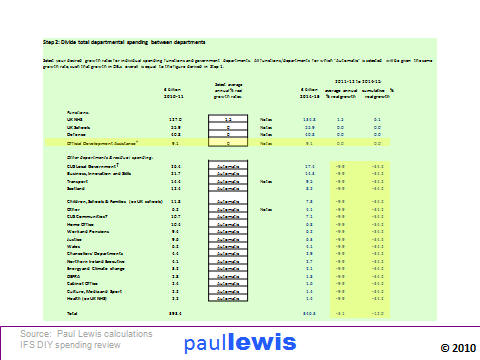
And
it is no coincidence that David Cameron has said he would cut Whitehall by a
third. But not just Whitehall, Cardiff, Edinburgh, Newcastle, every town in the
UK where people work for the state would have to be cut by a third.
And
this is keeping spending at the same level it is now roughly. But even freezing
overall spending implies big cuts in the things that are not protected. And by
keeping spending at the same level it is now you are relying on growth and
rising taxes to close this gap between income an spending.
But
if you look at the manifestos of the main parties – Labour, Conservative,
Liberal Democrat and Plaid Cymru – you will see very little about raising money
from tax rises. They all do a bit of it. But every rise in taxes actually pays
for a cut in tax somewhere else. And on spending they speak of
tough choices (Labour manifesto)
tough choices (Liberal Democrat manifesto)
Urgent action is needed (Conservative manifesto)
But
the details disappoint – they are a few billion here and there on efficiencies,
on getting rid of waste.
“with
£950m saved through
“cut
Even the Lib Dems who say
We have already identified over £15 billion of savings in government spending
£10
billion is a drop in a very big ocean of debt.
No
wonder the FT says there is a £30 billion hole at the heart of the political
parties’ plans.
So
what really radical ideas could we have?
Do
any of you here have a cash ISA? There’s about £158 billion in cash ISAs – if
the Government confiscated al that money – just took it – that wouldn’t quite
clear the deficit this year. And next year we would be back to borrowing £131
billion on current plans. So next year it could confiscate all the investment
ISAs as well £116bn that would almost clear next year’s deficit. After that? Not
much left.
We
could cut the state pension – say £10 a week off that and off pension credit too
of course – would save £6bn a year or so.
Or
we could cut all social security benefits and pensions by 10$ - that might save
£15 billion.
But
there is another choice.
David Cameron likes to give a homely example. When families face financial
troubles they cut back their spending. Yes. But they also try to earn more. Take
an extra part-time job, get a promotion, or do a bit of work on the side.
So
could we tax our way out of the hole? Each 1p on income tax brings in £4.75
billion next year. Labour has said it will not change the tax rates. And for
decades the only way income tax rates have gone is down.
However, it has said nothing about tax allowances – the tax-free bit of our
income that we have before we pay tax. It is already scrapping that for people
with an income over £100,000. If all tax allowances were cut by 10% – a few
hundred pounds – then that could bring in £8.5 billion.
And
each extra percent on VAT raises the same amount as 1p on income tax. So raising
it to 20% would be a simple way to bring in almost £12 billion a year.
And
raising stamp duty by 1% point on all rates would raise almost £2.5bn.
These are very tempting to any new government that wants to balance the books
more quickly.
The
Conservatives say they will move towards a balanced budget more quickly than
Labour plans.
But
whoever is in power Labour, Cons, Lib Dem – or even Plaid Cymru holding the
balance of power in a hung parliament – the deficit will have to be dealt with.
When I was young I had a poster in my room
Whoever you vote for the Government will get in.
In
fact whoever you vote for the Treasury will get in. Or as Eben Halford a 38 yr
old IT consultant told The Times “there’s not much to choose between
them. The head may change but the machine underneath doesn’t.” (The Times
14/4/10)
And
whoever becomes Chancellor after the election will face some pretty grim
choices. Cuts in jobs – and tax rises.
How
will this affect housing?
Now
one of the cuts that will be made is in housing support. Cuts to direct support.
Cuts to wales government. Cuts to local authorities.
1.
Easy to make
2.
Blame devolved government (assembly/local councils)
3.
Not much in the manifestos.
Lab:
we will enable more people to get on the housing ladder
LD:
providing more affordable homes
Con:
We will make it easier for everyone to get onto the housing ladder
Plaid Cymru understands the difficulties that first-time buyers face in getting
onto the first rung of the housing ladder
We
have become dependent on home ownership and its once inexorable growth.
That was partly because of the end of security and rent control for private
tenants.
But
now home ownership is declining in UK – below 70% (though not in Wales where
still 73%) as prices have been driven to artificial heights.
Prices are rising because of supply and demand.
Number of households is increasing but dwellings not being built to match. So
demand is increasing faster than supply. So prices will rise.
We
saw a temporary halt in demand because of lack of finance. But the home
ownership market is very resilient.
Young people being priced out of the market by higher deposits. That leaves some
rural areas unaffordable for those who were born there. That damages
communities.
You
can get 90% loans but only if you have a squeaky clean credit rating and a good
steady job – preferably two good steady jobs.
Changes: we need to increase supply of homes. Major house building for rent by
the state. That will take the pressure off prices and let them fall back down
again.
Long term: change tenure laws so that people do get security of tenure. With
lower prices landlords will come back into the market and will be able to make a
reasonable return from rents not capital growth.
Until that happens banks must play their part – especially those that are part
owned by taxpayers – the very people whose children can no longer get the loans
they need. Not with silly loans, not 125% loans nor even 100% loans but with
loans up to 90% on reasonable terms for the right people.
And
of course in Wales you have a particular problem of second homes. And it really
is unacceptable for people who already have a home to buy another and push
prices up to cut out local first time buyers. It is wrong. But I don’t know how
to solve it any more than you do.
So
the economy of the UK is in difficulties. Deep down it is very strong. We have a
large and hard-working population, an effective infrastructure, and a long
history of entrepreneurialism. But we have been spending more than our income
for years. And we have to stop.
And anyone who thinks that will be painless or easy is fooling themselves. And anyone who simply fails to talk about it at all is probably standing for election.
Thank you.